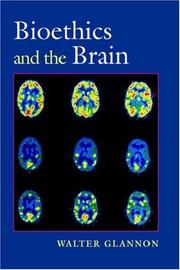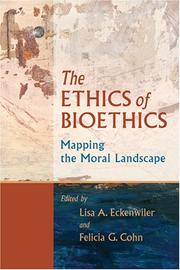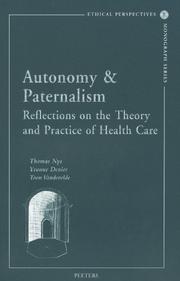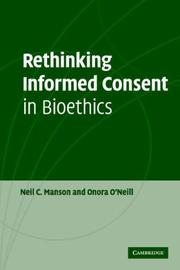| Listing 1 - 10 of 17 | << page >> |
Sort by
|
Book
ISBN: 1281048968 9786611048969 0080476104 9780080476100 9780750682275 0750682272 Year: 2007 Publisher: Amsterdam ; Boston : Elsevier/Academic Press,
Abstract | Keywords | Export | Availability | Bookmark
 Loading...
Loading...Choose an application
- Reference Manager
- EndNote
- RefWorks (Direct export to RefWorks)
Biomedical Ethics for Engineers provides biomedical engineers with a new set of tools and an understanding that the application of ethical measures will seldom reach consensus even among fellow engineers and scientists. The solutions are never completely technical, so the engineer must continue to improve the means of incorporating a wide array of societal perspectives, without sacrificing sound science and good design principles.Dan Vallero understands that engineering is a profession that profoundly affects the quality of life from the subcellular and nano to the planetary scale. Protect
Biomedical engineering --- Medical ethics. --- Bioethics. --- Moral and ethical aspects. --- Biology --- Biomedical ethics --- Life sciences --- Life sciences ethics --- Clinical ethics --- Ethics, Medical --- Health care ethics --- Medical care --- Medicine --- Clinical engineering --- Medical engineering --- Moral and ethical aspects --- Science --- Bioethics --- Professional ethics --- Nursing ethics --- Social medicine --- Bioengineering --- Biophysics --- Engineering

ISBN: 9042021799 9401204195 1429481501 9781429481502 9789401204194 9789042021792 Year: 2007 Publisher: Amsterdam New York Rodopi
Abstract | Keywords | Export | Availability | Bookmark
 Loading...
Loading...Choose an application
- Reference Manager
- EndNote
- RefWorks (Direct export to RefWorks)
This book deals with the international assessment and regulation of biomedical research. In its chapters, some of the leading figures in today’s bioethics address questions centred on global development, scientific advances, and vulnerability. The series Values In Bioethics makes available original philosophical books in all areas of bioethics, including medical and nursing ethics, health care ethics, research ethics, environmental ethics, and global bioethics.
Bioethical Issues. --- Biomedical Research -- Ethics. --- Internationality. --- Biomedical Research --- Internationality --- Bioethical Issues --- Research --- Social Sciences --- Ethics --- Anthropology, Education, Sociology and Social Phenomena --- Science --- Humanities --- Natural Science Disciplines --- Disciplines and Occupations --- Medical ethics --- Bioethics --- Bioethics. --- Medical ethics. --- Biomedical ethics --- Clinical ethics --- Ethics, Medical --- Health care ethics --- Medical care --- Medicine --- Professional ethics --- Nursing ethics --- Social medicine --- Biology --- Life sciences --- Life sciences ethics --- Moral and ethical aspects

ISBN: 1442684771 9781442684775 9780802092854 0802092853 Year: 2007 Publisher: Toronto University of Toronto Press
Abstract | Keywords | Export | Availability | Bookmark
 Loading...
Loading...Choose an application
- Reference Manager
- EndNote
- RefWorks (Direct export to RefWorks)
Born in Bologna in 1922, filmmaker Pier Paolo Pasolini was one of the most controversial European intellectuals of his time. Pasolini believed the 'authentic' Italy - with its many languages and subcultures, its ancient roots and idiosyncrasies - to be disappearing before his eyes, and he used his films to denounce the social and ideological forces he felt were responsible for this detrimental change. Rather than campaign with overtly political films, however, Pasolini vested ideological impetus in key film characters, many of whom were women.Drawing upon Italy's distinct socio-cultural history as well as feminist and psychoanalytic approaches to film, Colleen Ryan-Scheutz explores the ways in which Pasolini's representations of women reveal his concerns about purity in modern Italian society. Ryan-Scheutz demonstrates how Pasolini used his female figures onscreen to critique the ruling class from a decisively different perspective and propose a range of alternatives to the increasingly sterile and capitalistic world of Italy and the West. Providing a new critical approach to Pasolini studies, Sex, the Self, and the Sacred brings psychoanalytic and feminist theories to bear on the auteur's lifelong poetics and theoretical writings on cinema.
Medical ethics. --- Bioethics. --- Bioethics --- Biomedical Ethics --- Health Care Ethics --- Ethics, Biomedical --- Ethics, Health Care --- Ethics, Medical --- Ethicists --- Biomedical ethics --- Clinical ethics --- Health care ethics --- Medical care --- Medicine --- Professional ethics --- Nursing ethics --- Social medicine --- Biology --- Life sciences --- Life sciences ethics --- Science --- Moral and ethical aspects --- Pasolini, Pier Paolo, --- Criticism and interpretation. --- Critique et interprétation. --- Pasolini, Pier Paolo
Book
ISBN: 9782130542827 2130542824 Year: 2007 Publisher: Paris: PUF,
Abstract | Keywords | Export | Availability | Bookmark
 Loading...
Loading...Choose an application
- Reference Manager
- EndNote
- RefWorks (Direct export to RefWorks)
Quels sont les enjeux éthiques entre les sciences du vivant, l'impact éthique de la recherche sur embryons, et les représentations sociales construites à partir de conflits de convictions ou de représentations narratives sur l'origine de la vie ? Quelle place ont prise les femmes dans ce débat ? Comment la délocalisation de l'embryon, de l'utérus à la cité, met-elle en jeu la hiérarchie des sexes dans la fabrication d'enfants, et quel sera, dès lors, l'avenir de la naissance ? Telles sont quelques-unes des questions auxquelles répondent les deux auteurs.
Human embryo --- Embryology, Human --- Human reproductive technology --- Bioethics --- Moral and ethical aspects --- reproductieve technologie --- ethiek (ethische aspecten) --- bio-ethiek (medische, biomedische ethiek, bio-ethische aspecten) --- technique de reproduction --- ethique (aspects ethiques) --- bioéthique (éthique médicale, biomédicale, aspects bioéthiques) --- Embryo, Human --- Human embryology --- Embryology --- Human biology --- Human reproduction --- Biology --- Biomedical ethics --- Life sciences --- Life sciences ethics --- Science --- Human embryo - Moral and ethical aspects --- Embryology, Human - Moral and ethical aspects --- Human reproductive technology - Moral and ethical aspects

ISBN: 9780195307788 019530778X 0199867437 0195371941 9786610846634 0199719071 1280846631 1429420774 Year: 2007 Publisher: Oxford Oxford university press
Abstract | Keywords | Export | Availability | Bookmark
 Loading...
Loading...Choose an application
- Reference Manager
- EndNote
- RefWorks (Direct export to RefWorks)
Our ability to map and intervene in the structure of the human brain is proceeding at a very quick rate. Advances in psychiatry, neurology, and neurosurgery have given us fresh insights into the neurobiological basis of human thought and behavior. Technologies like MRI and PET scans can detect early signs of psychiatric disorders before they manifest symptoms. Electrical and magnetic stimulation of the brain can non-invasively relieve symptoms of obsessive-compulsive disorder, depression and other conditions resistant to treatment, while implanting neuro-electrodes can help patients with Parkinsons and other motor control-related diseases. New drugs can help regenerate neuronal connections otherwise disrupted by schizophrenia and similar diseases. All these procedures and drugs alter the neural correlates of our mind and raise fascinating and important ethical questions about their benefits and harms. They are, in a sense, among the most profound bioethical questions we face, since these techniques can touch on the deepest aspects of the human mind: free will; personal identity; the self; and the soul. This is the first single-author book on what has come to be known as neuroethics. Walter Glannon uses a philosophical framework that is fully informed by cutting edge neuroscience as well as contemporary legal cases such as Terri Schiavo, to offer readers an introduction to this fascinating topic. He starts by describing the state of the art in neuroscientific research and treatment, and gives the reader an up-to-date picture of the brain. Glannon then looks at the ethical implications of various kinds of treatments, such as: whether or not brain imaging will end up changing our views on free will and moral responsibility; whether patients should always be told that they are at future risk for neurological diseases; if erasing unconscious emotional memories implicated in depression can go too far; if forcing behavior-modifying drugs or surgery on violent offenders
neurowetenschappen --- neurologie --- neuroethiek --- vrije wil --- lichaam-geestprobleem --- medische technologie --- geneeskundige behandeling --- neurosciences --- neurology --- neuroéthique --- libre-arbitre --- problème corps-esprit --- technologie médicale --- traitement médical --- Bioethics. --- Brain --- Medical ethics. --- Neurosciences --- Research --- Moral and ethical aspects. --- Bioethics --- Medical ethics --- Neural sciences --- Neurological sciences --- Neuroscience --- Medical sciences --- Nervous system --- Biomedical ethics --- Clinical ethics --- Ethics, Medical --- Health care ethics --- Medical care --- Medicine --- Professional ethics --- Nursing ethics --- Social medicine --- Cerebrum --- Mind --- Central nervous system --- Head --- Biology --- Life sciences --- Life sciences ethics --- Science --- Research&delete& --- Moral and ethical aspects

ISBN: 0801892260 1435692683 9781435692688 9780801892264 0801886090 9780801886096 9780801886096 9780801886126 0801886090 0801886120 Year: 2007 Publisher: Baltimore Johns Hopkins University Press
Abstract | Keywords | Export | Availability | Bookmark
 Loading...
Loading...Choose an application
- Reference Manager
- EndNote
- RefWorks (Direct export to RefWorks)
Stem cell research. Drug company influence. Abortion. Contraception. Long-term and end-of-life care. Human participants research. Informed consent. The list of ethical issues in science, medicine, and public health is long and continually growing. These complex issues pose a daunting task for professionals in the expanding field of bioethics. But what of the practice of bioethics itself? What issues do ethicists and bioethicists confront in their efforts to facilitate sound moral reasoning and judgment in a variety of venues? Are those immersed in the field capable of making the right decisions? How and why do they face moral challenge -- and even compromise -- as ethicists? What values should guide them? In The Ethics of Bioethics, Lisa A. Eckenwiler and Felicia G. Cohn tackle these questions head on, bringing together notable medical ethicists and people outside the discipline to discuss common criticisms, the field's inherent tensions, and efforts to assign values and assess success. Through twenty-five lively essays examining the field's history and trends, shortcomings and strengths, and the political and policy interplay within the bioethical realm, this comprehensive book begins a much-needed critical and constructive discussion of the moral landscape of bioethics.
Politics. --- Ethics, Professional. --- Bioethics. --- Professional ethics. --- Medical ethics. --- Codes of ethics --- Codes of professional ethics --- Ethical codes --- Professional responsibility --- Professions --- Ethics --- Biology --- Biomedical ethics --- Life sciences --- Life sciences ethics --- Science --- Clinical ethics --- Ethics, Medical --- Health care ethics --- Medical care --- Medicine --- Bioethics --- Professional ethics --- Nursing ethics --- Social medicine --- Moral and ethical aspects --- Medical ethics --- bio-ethiek (medische, biomedische ethiek, bio-ethische aspecten) --- bioéthique (éthique médicale, biomédicale, aspects bioéthiques)

ISBN: 9789042918801 9042918802 Year: 2007 Volume: 5 Publisher: Leuven ; Paris ; Dudley MA Peeters
Abstract | Keywords | Export | Availability | Bookmark
 Loading...
Loading...Choose an application
- Reference Manager
- EndNote
- RefWorks (Direct export to RefWorks)
In recent years, the triumph of autonomy has made paternalist interventions increasingly problematic. The value of a patient's right to self-determination and the practice of informed consent are considered supremely important in present-day health care ethics. In general, the idea of 'doctor knows best' has become more and more suspicious. This has left us with a situation in which paternalist medicine seems difficult to reconcile with respect for patient autonomy. This book offers a thorough reflection on the relationship between autonomy and paternalism, and argues that, from both theoretical and practical angles, the tension between these concepts is not as acute as it might seem. In long-term care, psychiatry, and care for the severely handicapped, the principle of respect for autonomy is particularly ill-suited. This, however, does not mean that such respect is totally irrelevant, but that it should take a different shape. Good care in those cases requires us to transcend the sharp dichotomy between autonomy and paternalism. In Autonomy and Paternalism: Reflections on the Theory and Practice of Health Care various acclaimed authors present their views on this interesting and extremely relevant debate.
Professional ethics. Deontology --- W 50 Medical ethics --- Ethics, Medical --- Paternalism --- Personal Autonomy --- Medical ethics. --- Bioethics. --- Autonomy (Psychology) --- Paternalism. --- Academic collection --- 174.2 --- Beroepsmoraal van de artsen. Medische beroepsethiek --- 174.2 Beroepsmoraal van de artsen. Medische beroepsethiek --- Bioethics --- Medical ethics --- Parentalism --- Social classes --- Social control --- Social systems --- Biomedical ethics --- Clinical ethics --- Health care ethics --- Medical care --- Medicine --- Professional ethics --- Nursing ethics --- Social medicine --- Biology --- Life sciences --- Life sciences ethics --- Science --- Freedom (Psychology) --- Independence (Psychology) --- Self-determination (Psychology) --- Self-direction (Psychology) --- Dependency (Psychology) --- Ego (Psychology) --- Emotions --- Moral and ethical aspects

ISBN: 9780691121901 9780691121918 0691121915 0691121907 9786612458293 1400827507 1282458299 9781400827503 9781282458291 6612458291 Year: 2007 Publisher: Princeton/Oxford Princeton University Press
Abstract | Keywords | Export | Availability | Bookmark
 Loading...
Loading...Choose an application
- Reference Manager
- EndNote
- RefWorks (Direct export to RefWorks)
For centuries, medicine aimed to treat abnormalities. But today normality itself is open to medical modification. Equipped with a new molecular understanding of bodies and minds, and new techniques for manipulating basic life processes at the level of molecules, cells, and genes, medicine now seeks to manage human vital processes. The Politics of Life Itself offers a much-needed examination of recent developments in the life sciences and biomedicine that have led to the widespread politicization of medicine, human life, and biotechnology.Avoiding the hype of popular science and the pessimism of most social science, Nikolas Rose analyzes contemporary molecular biopolitics, examining developments in genomics, neuroscience, pharmacology, and psychopharmacology and the ways they have affected racial politics, crime control, and psychiatry. Rose analyzes the transformation of biomedicine from the practice of healing to the government of life; the new emphasis on treating disease susceptibilities rather than disease; the shift in our understanding of the patient; the emergence of new forms of medical activism; the rise of biocapital; and the mutations in biopower. He concludes that these developments have profound consequences for who we think we are, and who we want to be.
Sociology of knowledge --- Professional ethics. Deontology --- Human medicine --- Bioethics --- Medical innovations --- Bioéthique --- Medecine --- Social aspects --- Innovations --- Aspect social --- #SBIB:316.334.3M40 --- #SBIB:316.7C122 --- #SBIB:39A9 --- Medische sociologie: zorgenverstrekkers, relatie met hulpvragers --- Cultuursociologie: overtuigingen, waarden en houdingen --- Medische antropologie / gezondheid / handicaps --- Erfelijkheidsleer --- Fysiologie --- Psychofarmaca --- Geneesmiddelen --- Bioethics. --- Bioéthique. --- Médecine --- Bioethical Issues. --- Biotechnology --- Ethische aspecten. --- Genomica. --- Politieke aspecten. --- Social aspects. --- Aspect social. --- ethics. --- Bioéthique. --- Médecine --- Ethics. --- Bioéthique --- Society and medical innovations --- Biology --- Biomedical ethics --- Life sciences --- Life sciences ethics --- Moral and ethical aspects --- Bioethique. --- Science --- Bioethical Issue --- Issue, Bioethical --- Issues, Bioethical --- Euthanasia --- Human Experimentation --- Patient Rights --- Animal Experimentation --- Chemical engineering --- Genetic engineering --- Psychofarmacon --- Geneesmiddel --- Droit médical

ISBN: 1281044385 9786611044381 1402062605 1402062591 9048175860 Year: 2007 Volume: 94 Publisher: Dordrecht : Springer Netherlands : Imprint: Springer,
Abstract | Keywords | Export | Availability | Bookmark
 Loading...
Loading...Choose an application
- Reference Manager
- EndNote
- RefWorks (Direct export to RefWorks)
Baruch A. Brody has been one of the most important voices in bioethics over the last several decades, asking new and challenging questions about a range of problems, examining recalcitrant issues in novel ways, always with the goal of offering practical solutions to complex problems. This volume presents a sustained philosophical analysis of Brody’s contributions to biomedical ethics. The essays in this volume compass epistemological, methodological, and topical contributions to bioethics, including both application and criticism of Brody’s normative moral theory – pluralistic casuistry – Jewish medical ethics, human embryo transfer, medical futility, life and death decisions in pediatrics, euthanasia and end-of-life decision-making, the obligations of clinical researchers toward study participants, and professional integrity. Done well, philosophical work can clarify complex issues, facilitate creative problem solving, and lead to real-world solutions to difficult situations. Each contributor carefully and critically explores Brody’s writings in biomedical ethics and the philosophy of medicine, illustrating his appreciation that thorough and critical scientific research and philosophical analysis are central to reining in the untutored human desire to ameliorate pain and suffering so that medical treatments and health care policy do more good than harm.
Bioethics. --- Casuistry. --- Medical ethics. --- Medicine --- Religious aspects --- Judaism. --- Philosophy. --- Brody, Baruch A. --- Medical logic --- Biomedical ethics --- Clinical ethics --- Ethics, Medical --- Health care ethics --- Medical care --- Bioethics --- Professional ethics --- Nursing ethics --- Social medicine --- Moral and ethical aspects --- Jews --- Cases of conscience --- Christian ethics --- Ethics --- Scholasticism --- Applied ethics --- Biology --- Life sciences --- Life sciences ethics --- Science --- Brody, Baruch --- Brody, Boruch A. --- Ethics. --- Medicine-Philosophy. --- Philosophy of Medicine. --- Theory of Medicine/Bioethics. --- Deontology --- Ethics, Primitive --- Ethology --- Moral philosophy --- Morality --- Morals --- Philosophy, Moral --- Science, Moral --- Philosophy --- Values --- Health Workforce --- Medicine—Philosophy.

ISBN: 9780521697477 9780521874588 0521697476 0521874580 9780511814600 9780511286247 0511286244 0511285507 9780511285509 0511814607 9780511284700 0511284705 1107172314 1280909463 9786610909469 0511283903 0511321120 Year: 2007 Publisher: Cambridge : Cambridge University Press,
Abstract | Keywords | Export | Availability | Bookmark
 Loading...
Loading...Choose an application
- Reference Manager
- EndNote
- RefWorks (Direct export to RefWorks)
Informed consent is a central topic in contemporary biomedical ethics. Yet attempts to set defensible and feasible standards for consenting have led to persistent difficulties. In Rethinking Informed Consent in Bioethics, first published in 2007, Neil Manson and Onora O'Neill set debates about informed consent in medicine and research in a fresh light. They show why informed consent cannot be fully specific or fully explicit, and why more specific consent is not always ethically better. They argue that consent needs distinctive communicative transactions, by which other obligations, prohibitions, and rights can be waived or set aside in controlled and specific ways. Their book offers a coherent, wide-ranging and practical account of the role of consent in biomedicine which will be valuable to readers working in a range of areas in bioethics, medicine and law.
Informed Consent --- Informed consent (Medical law) --- Bioethics. --- Medicine --- Consentement éclairé (Droit médical) --- Bioéthique --- Médecine --- ethics. --- Research --- Moral and ethical aspects. --- Recherche --- Aspect moral --- Bioethics --- Moral and ethical aspects --- Informed consent (Medical law). --- Consentement éclairé (Droit médical) --- Bioéthique --- Médecine --- Health Workforce --- Consent, Informed --- Consent to treatment --- Disclosure, Medical --- Medical disclosure --- Treatment, Consent to --- Consent (Law) --- Medical ethics --- Medical personnel --- Patient education --- Involuntary treatment --- Patient refusal of treatment --- Biology --- Biomedical ethics --- Life sciences --- Life sciences ethics --- Science --- Research&delete& --- Malpractice --- Arts and Humanities --- Philosophy --- Medicine - Research - Moral and ethical aspects --- Droit médical
| Listing 1 - 10 of 17 | << page >> |
Sort by
|

 Search
Search Feedback
Feedback About
About Help
Help News
News